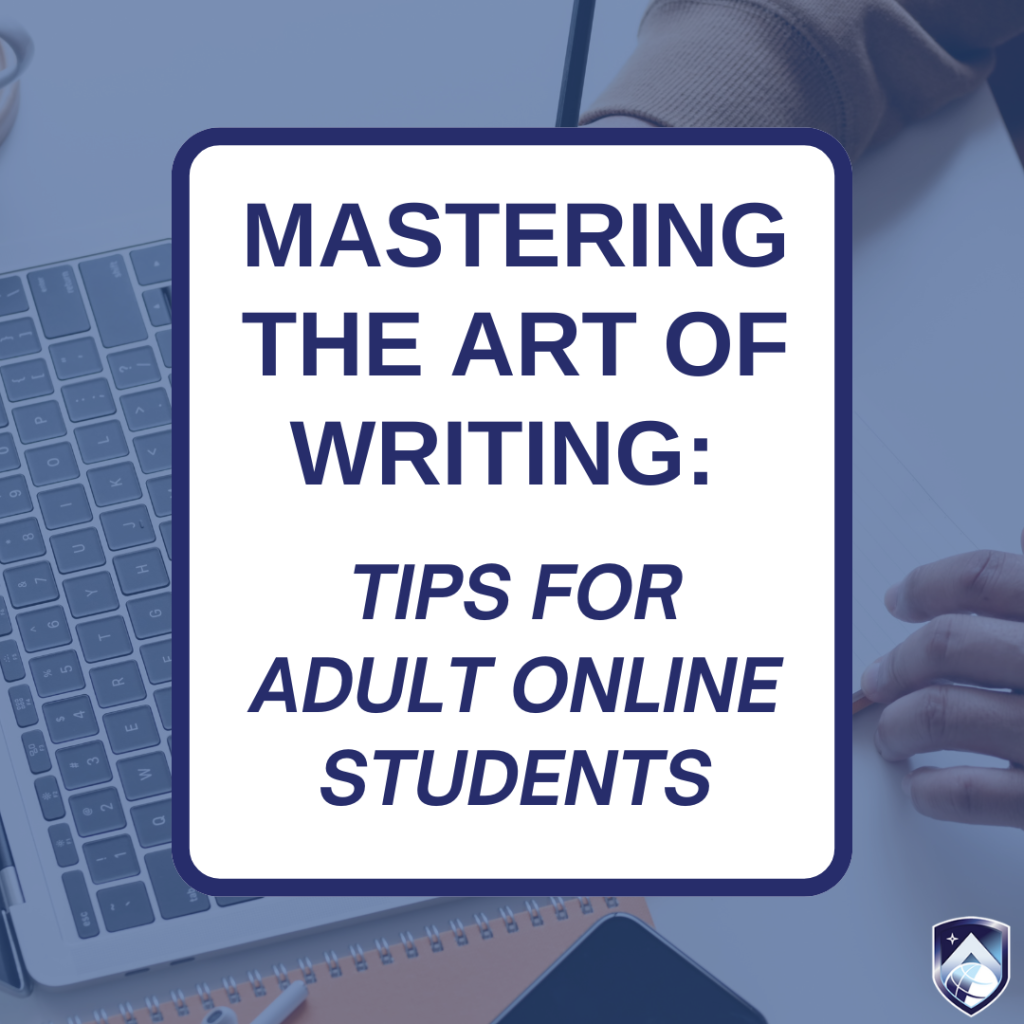Returning to college as an adult is an exciting and rewarding endeavor. However, if you’ve been out of school for a while, you may find yourself feeling a bit rusty when it comes to writing academic papers, literature reviews, discussion posts, and essays. Fortunately, with the right strategies and resources, you can brush up on your writing skills and excel in your online courses. In this blog post, we’ll explore practical tips to help you sharpen your writing skills and succeed as an adult online student.
- Start with a Strong Foundation: Before diving into complex writing assignments, it’s important to revisit the fundamentals of writing. Review grammar rules, punctuation guidelines, and sentence structure basics to ensure that your writing is clear, concise, and error-free. Aspen lists the Publication Manual of the American Psychological Association (7th Edition) as a required textbook for every course, which provides comprehensive guidelines for grammar and style. The APA also has abundant resources on their website, and additional APA resources can be found in Aspen’s Library.
- Practice Regularly: Like any skill, writing improves with practice. Set aside dedicated time each day or week to practice writing. Start with simple exercises, such as journaling, free writing, or responding to writing prompts, to get into the habit of expressing your thoughts and ideas on paper. As you become more comfortable with writing, gradually challenge yourself with more complex assignments and topics.
- Read Widely and Analytically: Reading is essential for improving your writing skills. Expose yourself to a variety of written materials, including books, articles, essays, and academic papers, across different genres and topics. Pay attention to the writing styles, techniques, and structures used by the authors, and analyze how they effectively convey their ideas and arguments. Reading widely will inspire and inform your own writing practice.
- Understand the Assignment Requirements: Before starting any writing assignment, carefully review the assignment instructions and requirements. Pay attention to the specific guidelines, formatting conventions, and evaluation criteria provided by your instructor. Clarify any questions or uncertainties you may have with your instructor to ensure that you fully understand what is expected of you. Following the assignment requirements will help you stay focused and meet the expectations of your instructors.
- Plan and Organize Your Ideas: Effective writing begins with careful planning and organization. Before starting your paper, take the time to brainstorm ideas, outline your main points, and develop a clear structure for your writing. Consider using graphic organizers, outlines, or mind maps to visually map out your ideas and ensure logical flow and coherence in your writing. Planning and organizing your thoughts will make the writing process smoother and more efficient.
- Conduct Thorough Research: Research papers and literature reviews require thorough research to support your arguments and assertions. Familiarize yourself with credible research sources and databases available online, such as academic journals, scholarly articles, and reputable websites. Take notes, cite sources accurately, and critically evaluate the quality and relevance of the information you gather. Incorporating well-researched evidence into your writing will strengthen your arguments and enhance the credibility of your work. Here are a couple library guides that help with conducting research:
- Seek Feedback and Revision: Don’t be afraid to seek feedback on your writing from peers, instructors, or writing tutors. Share your drafts with others and solicit constructive feedback on areas for improvement. Be open to suggestions and criticism, and use feedback to revise and refine your writing. Revision is an essential part of the writing process and allows you to polish your work until it meets your standards and the expectations of your instructors. Meticulously apply your instructor’s feedback to future assignments for continuous improvement. If you get an instructor who is more nit-picky with writing and APA, use it as a positive opportunity to fine-tune your skills!
- Practice Time Management: Effective time management is crucial for completing writing assignments on time and avoiding last-minute stress. Break down large writing tasks into smaller, manageable steps, and create a realistic schedule with deadlines for each step. Set aside dedicated time for research, writing, revising, and editing, and stick to your schedule to stay on track. Prioritize your tasks and allocate your time wisely to ensure that you meet your deadlines without feeling overwhelmed.
- Stay Persistent and Patient: Improving your writing skills is a gradual process that requires persistence and patience. Don’t get discouraged by setbacks or challenges along the way. Stay committed to your writing practice, embrace opportunities for growth and learning, and celebrate your progress and achievements. With dedication and perseverance, you’ll continue to refine your writing skills and achieve success in your academic endeavors as an adult online student.
Mastering the art of writing as an adult online student requires practice, patience, and perseverance. By following these tips you can sharpen your writing skills and excel in your online college courses. So, embrace the writing process with confidence and determination, and let your newfound writing skills propel you towards academic success and personal growth as an adult online student.
For more guidance in scholarly writing, attend sessions of the AU Scholarly Writing webinar series starting in January 2025! Links to register are found below.
Session 1: The Art of Scholarly Writing
Date: January 8, 2025, at 10:00 AM Pacific
Reasons for Following APA Style, When to Use Scholarly Writing, Tone, Why Not to Rely on Automatic Reference/Citation Generators, Ethical Use of Augmented Intelligence
For more webinars, visit the AU Scholarly Writing Series.

